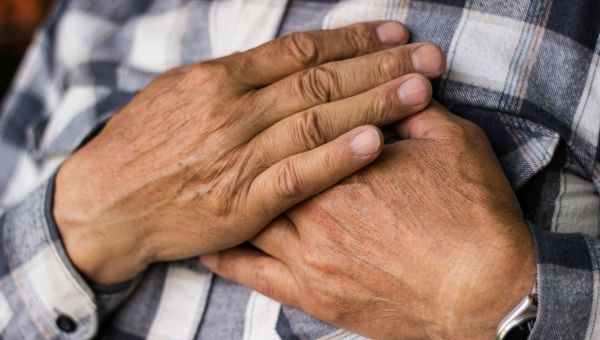The 10 deadliest men's health conditions
Learn the biggest reasons most American men die, and how you can decrease your risk.

From heart disease to drug overdoses to pneumonia, these 10 conditions and events cause about 3 of every 4 male deaths in the United States, claiming the lives of around 1 million men in 2015 alone.
Read on to find out what they are, and how they specifically affect men. Plus, learn how to identify symptoms, get treatment and, in some cases, reduce your risk of dying.

#10: Chronic liver disease
Driven largely by hepatitis- and alcohol-related conditions like cirrhosis, chronic liver disease became a top ten cause of death in males only recently, in 2013. And while women do suffer from liver disease, far more men die of it, due mostly to more drinking. Men are likelier to drink excessively, binge drink and be hospitalized for alcohol-related issues.
Cirrhosis occurs when healthy tissue in the liver is supplanted by scar tissue, which eventually causes the liver to stop functioning. The damage is irreversible, though much of it can be prevented by abstaining from alcohol, avoiding behaviors—like intravenous drug use—that increase your risk of hepatitis C, and treating existing hepatitis.

#9: Influenza and pneumonia
Coming down with the flu or a developing a touch of pneumonia may not seem like too big a deal for most people, but for those with weaker immune systems—namely, folks under age 2 or over age 65—the illnesses are lethal enough to kill thousands every year. In general, pneumonia is the far deadlier disease, enough so that it's been nicknamed "the old man's friend."
To protect against both pneumonia and the flu, you should avoid cigarette smoke, wash your hands frequently and have up-to-date vaccinations. If you're immune-compromised and presenting symptoms of either, which include fever, aches and coughing, see your doctor.

#8: Alzheimer's disease
In 2015, Alzheimer's Disease claimed the lives of over 33,000 men, and almost 77,000 women. The difference is largely due to gender and age; the risk of developing the condition increases as we get older—to almost 50 percent by age 85—and US women live outlive men by five years, to an average of 81.2.
Around 2 million American males are currently living with Alzheimer's. While it can't be prevented, the risk can be mitigated through regular exercise, a heart-healthy diet, maintaining strong social connections and not smoking. If you're experiencing symptoms—memory loss, confusion, mood shifts—contact your health provider, who can provide a diagnosis and guidance.

#7: Suicide
The US suicide rate jumped 30 percent between 2000 and 2016. In 2015, almost 34,000 American men died by suicide, compared to over 10,000 women.
Risk factors for suicide include drug abuse and gun ownership—both of which are likelier for men than women—as well as mental illness. It's estimated that up to 90 percent of people who commit suicide suffer from depression, bipolar disorder, schizophrenia and other disorders.
If you or someone you love is contemplating suicide, call, text, or chat 988 to reach the 988 Suicide & Crisis Lifeline as soon as you can.

#6: Diabetes
Diabetes remains a top killer of US men year after year, with more than 43,000 dying of the illness in 2015. That number is probably underreported, however, as studies show that diabetes is the cause of or a contributing factor in many more deaths. In fact, one 2017 study from PLOS One found that 12 percent of US deaths are likely brought on by diabetes—far greater than the current estimation of about 3 percent.
Though both genders get type 2 diabetes largely for the same reasons—including obesity, inactivity and genetics—rates are higher for males, possibly because they're more susceptible. Studies have found men don't need to gain as much weight as women to develop the condition.
Want to drop pounds? Consider tracking your weight, which has been shown to contribute to weight loss by reinforcing healthy behaviors; monitor your progress using the weight tracker on Sharecare, available for iOS and Android.

#5: Stroke
Despite a plunge in mortalities since 1970, stroke continues to be one of America's deadliest health issues, as well as a main cause of long-term disability. Younger men are more prone to strokes than younger women, though the overall risk increases for everyone as they age; both genders are likelier to experience one after 65. Other risk factors include smoking, obesity, inactivity, hypertension and heavy alcohol use.
Strokes can be identified via the FAST method, or by recognizing facial drooping, weakness in the arms and speech difficulties—and then dialing 911 as quickly as possible. Studies show the faster the victim receives treatment, the better their chances are of recovery.

#4: Chronic lower respiratory disease
Though it's an umbrella term for multiple lung ailments, chronic lower respiratory disease is largely defined by one illness: chronic obstructive pulmonary disease, or COPD. Each year, COPD and its related conditions—mostly emphysema and bronchitis—kill tens of thousands American men, and even more women.
COPD is primarily caused by smoking. Air quality plays a role, as well, which may help explain why disease rates and mortalities are generally higher in some areas, like coal regions in Appalachia, where many men work in mines and are consistently exposed to coal and silica dust.
There is no way to reverse COPD. However, treatments can alleviate pain and help your day-to-day. See your doctor to learn more.

#3: Unintentional Injuries
Deadly unintentional injuries are the third-leading cause of men's deaths—and the number one cause for males under 45. Incidents in this category include falls, motor vehicle accidents, accidental poisoning and increasingly, drug overdoses.
Overdoses have spiked in recent years, driven by the opioid crisis; about 63 percent of the roughly 52,000 OD deaths in 2015 were related to prescription opioids and heroin. In 2016, ODs totaled about 64,000, with fentanyl becoming a major player. Though women are catching up, men remain likelier to die as a result of drug use.

#2: Cancer
"Malignant neoplasms," aka cancers, comprise around a quarter of US men's deaths annually—about as many as the next six causes combined. Men are most likely to get prostate, colorectal and lung cancer, with lung cancer mortalities totaling around 84,000 in 2015.
Around 17.5 percent of men smoke, part of why their chances of developing lung cancer are so high—about 1 in 15 over the course of a lifetime. To help prevent this—and improve the chances of avoiding cancer, period—quitting tobacco is a must. A decade after stopping, your risk of dying from lung cancer is halved, though you'll begin seeing health benefits immediately.

#1: Heart disease
Diseases of the heart regularly account for around a quarter of US male mortalities—upwards of 335,000 deaths in 2015. In general, men are more likely than women to die of chronic ischemic heart diseases—including heart attacks—in which blood is blocked from getting to the heart muscle. This is often due to atherosclerosis, a hardening of the arteries.
Despite the alarming numbers, the death rate from heart disease has actually plummeted from decades past, to less than a third of what it was in 1970. The American Heart Association attributes the drop to less smoking, better medical treatment, healthier living and increased environmental legislation.
More On


video

article

slideshow


video


video
